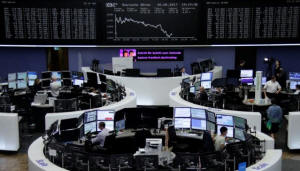|
Oil drop sends global stocks, bond yields
sliding
 Send a link to a friend
Send a link to a friend
 [June 21, 2017]
By Marc Jones and Sujata Rao [June 21, 2017]
By Marc Jones and Sujata Rao
LONDON (Reuters) - A renewed slump in oil
prices to seven-month lows dragged down world stocks on Wednesday and
flattened bond curves as bets that inflation and interest rates will
stay lower for even longer began to build again.
Signs of a growing glut of supply sent Brent crude futures skidding back
to $45.50 a barrel as European trading gathered momentum. Poorly
performing banking stocks also made for a weak start for London, Paris
and Frankfurt's stock markets.
The slide in energy costs boosted bond prices and flattened yield curves
as investors priced in lower inflation for longer, while safe-haven
flows underpinned the Japanese yen.
The spread between yields on U.S. five-year notes and 30-year bonds
<US5US30=TWEB> shrank to the smallest since 2007 as investors wagered
the Federal Reserve might have to delay further rate hikes.

Thirty-year German debt yields bonds also tumbled back toward two-month
lows, adding to a more than 20-basis-point drop over the past month and
ahead of what will now be a closely watched sale of 30-year debt in
Berlin later.
"The plunge in oil prices ignited a bull flattening on the German and
U.S. curve," analysts at UniCredit said in a note adding that it
suggested "reflation trades are finally deflated."
The recent setback for crude and commodity prices as well some equity
markets is partly down to doubts over U.S. President Donald Trump's
promised multi-trillion dollar stimulus program, which had raised hopes
of boosted inflation and growth.
"Brent now the lowest since mid-November: remember that whole reflation
thing? No, neither does the market," Rabobank analysts told clients in a
reference to Brent crude futures, which have slid almost 10 percent this
month <LCOc1>.
Oil had shed 2 percent on Tuesday, taking U.S. crude futures 20 percent
off recent highs and thus into official bear territory, a red flag to
investors who follow technical trends.
In Asia there had been muted reaction to global index provider MSCI's
decision to add the first batch of mainland Chinese stocks to its
popular emerging equity benchmark.
Indexes in Shanghai and Shenzen moved around 0.5 percent higher after
the decision, which could ultimately bring $340 billion of foreign
capital to the so-called A-share market.
The commodity and bond market turbulence and falls in Europe pushed
MSCI's all-country share index <.MIWD0000PUS> down 0.3 percent after its
0.7-percent slide on Tuesday compounded by a weak close on Wall Street
<.DJI> <.SPX>.
JOINING THE CLUB
The acceptance of some Chinese "A" shares into MSCI's Emerging Markets
Index was seen as a symbolic win for Beijing after three failed
attempts. Yet the step is still a small one.
[to top of second column] |

Traders work in front of the German share price index, DAX board, at
the stock exchange in Frankfurt, Germany, June 20, 2017.
REUTERS/Staff/Remote

Only 222 stocks are being included and, with a weighting of just 5
percent, they will account for only 0.73 percent of the Emerging
Markets Index <.MSCIEF>.
MSCI estimated the change, due around the middle of next year, would
drive inflows of between $17 billion and $18 billion. China's market
cap is roughly $7 trillion.
The index provider set out a laundry list of liberalization
requirements before it would consider further expansion.
"We suspect that it will be a long time before this happens," wrote
analysts at Capital Economics in a note.
"While China's weighting in the MSCI Emerging Markets Index may
ultimately rise to 40 percent or so, this rise is likely to be
slow," they added. "The upshot is that any initial boost to equities
is likely to be small."
The initial reaction was indeed restrained, with China's CSI300
index <.CSI300> up 0.5 percent.
MSCI also said it would consult on adding Saudi Arabia to the
emerging markets benchmark and that Nigeria will remain a frontier
market, but it shocked many emerging market investors by declining
to upgrade Argentina from the frontier market category.
In currency markets, the flight from oil and into long-dated
government bond benefited the safe-have yen which climbed to 111.120
per dollar. The U.S. currency was holding its own elsewhere though -
oil and the greenback often move inversely. Against a basket of
currencies, it was steady at 97.736 <.DXY> having touched a
five-week peak overnight.

The euro stood at $1.1131 <EUR=> after hitting a three-week low,
while the dollar eased a touch on the yen to 111.27 <JPY=>.
Sterling <GBP=> was still in the firing line sliding back under
$1.26 and towards 90 percent per euro.
It took a spill after Bank of England Governor Mark Carney hosed
down speculation that he might soon back higher interest rates,
saying he first wanted to see how the economy coped with Brexit
talks.
(Reporting by Wayne Cole; Editing by Eric Meijer and Andrew Heavens)
[© 2017 Thomson Reuters. All rights
reserved.]
Copyright 2017 Reuters. All rights reserved. This material may not be published,
broadcast, rewritten or redistributed. |